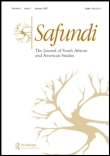
Safundi
Scope & Guideline
Exploring the Nexus of Culture, History, and Politics
Introduction
Aims and Scopes
- African Literature and Cultural Critique:
The journal publishes works that explore African literature, examining its role in cultural identity formation, resistance, and social commentary, particularly in the context of post-colonial and post-apartheid societies. - Historical and Political Analysis:
'Safundi' emphasizes historical narratives, particularly those related to apartheid, liberation movements, and the socio-political landscape of South Africa and the broader African continent, providing critical insights into these transformative periods. - Decolonial Studies:
The journal focuses on decoloniality, exploring how literature and cultural practices interact with colonial legacies, and how they contribute to new understandings of identity, space, and power dynamics. - Intersectionality of Gender and Sexuality:
Research published in 'Safundi' often addresses issues of gender, sexuality, and their implications within African contexts, highlighting diverse voices and experiences that challenge normative narratives. - Transnational and Diasporic Studies:
The journal investigates African diasporic literature and transnational connections, analyzing how these narratives inform and shape global perceptions of Africa and its cultures.
Trending and Emerging
- Decolonial Thought and Practices:
There is a growing emphasis on decoloniality, with increasing scholarly discourse addressing how African narratives can redefine and challenge colonial legacies, offering alternative ways of understanding history and identity. - Intersectionality and Queer Studies:
The journal is increasingly focusing on intersectional studies that examine the interplay of gender, sexuality, and race, particularly in the context of African societies, highlighting diverse and marginalized voices. - Cultural Production and Digital Spaces:
Emerging themes involve the examination of cultural production in digital spaces, exploring how technology influences African storytelling, activism, and the global representation of African identities. - Environmental and Ecocritical Perspectives:
Recent articles reflect an emerging interest in ecocriticism, addressing the relationships between literature, the environment, and socio-political issues in Africa, emphasizing sustainability and ecological awareness. - Global South Perspectives:
A trend towards exploring narratives from the Global South is evident, as the journal seeks to situate African experiences within broader international contexts, fostering dialogues that transcend geographical boundaries.
Declining or Waning
- Traditional Historical Narratives:
There seems to be a decline in interest towards conventional historical narratives that do not engage critically with contemporary issues. The journal is moving towards more dynamic interpretations that incorporate lived experiences and marginalized voices. - Mainstream Postcolonial Criticism:
The journal's focus on mainstream postcolonial criticism has decreased, possibly in favor of more nuanced approaches that integrate decolonial perspectives and intersectional analyses, indicating a shift towards more innovative frameworks. - Focus on South African Centrality:
While still significant, there is a noticeable reduction in articles solely centered on South African themes, as the journal expands its scope to include broader African and diasporic contexts, reflecting a more global perspective. - Historical Biographies of Prominent Figures:
There has been a decline in the publication of biographical studies focused solely on well-known historical figures, suggesting a move towards collective narratives and broader historical contexts instead. - Linear Narratives of Liberation Struggles:
The journal appears to be moving away from linear narratives of liberation struggles, which often oversimplify complex histories, in favor of more fragmented and multifaceted accounts that capture the richness of African experiences.
Similar Journals

Islamic Africa
Exploring the Rich Tapestry of Islamic Culture in AfricaIslamic Africa, published by BRILL, is a vital academic journal that serves as a scholarly platform dedicated to the exploration of Islamic culture and its multifaceted interactions with the African continent. With a focus on cultural studies, history, literature and literary theory, religious studies, and the social sciences, this journal invites contributions that deepen our understanding of the historical and contemporary dynamics of Islam in Africa. Although categorized in various quartiles, it holds significance as a resource for researchers and students, particularly those engaged in areas ranked within the Q3 and Q4 categories. Since its inception, Islamic Africa has evolved through converged years, actively promoting interdisciplinary dialogue among scholars. With its commitment to high-quality research, this journal aims to illuminate the complexities of Islamic traditions and societies in Africa, fostering a deeper appreciation of their contributions to global cultural heritage.
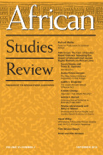
African Studies Review
Illuminating Contemporary Issues through Rigorous ScholarshipAfrican Studies Review, published by Cambridge University Press, serves as a leading academic journal in the fields of Anthropology and Cultural Studies. With a prestigious Q1 classification in Cultural Studies and Q2 in Anthropology, it is recognized for its high impact within the scholarly community, boasting a Scopus ranking in the 83rd and 70th percentiles respectively. Established in 1962, this journal has consistently provided a platform for rigorous analysis and discourse, exploring the complexities of African societies, cultures, and histories through multidisciplinary perspectives. While currently not offering Open Access options, the African Studies Review remains vital for researchers, professionals, and students alike, as it delves into innovative research and critical discussions that shape the understanding of contemporary African issues. Its ongoing commitment to excellence makes it an indispensable resource for those invested in African scholarship.

MEXICAN STUDIES-ESTUDIOS MEXICANOS
Bridging Past and Present in Mexican StudiesMEXICAN STUDIES-ESTUDIOS MEXICANOS, published by University of California Press, is a distinguished journal that explores critical issues in the fields of cultural studies and history, with a keen focus on Mexican and Latin American contexts. Established in 1985, this journal serves as an invaluable platform for researchers, professionals, and students alike, aiming to deepen understanding of Mexico's complex social, cultural, and historical landscapes. With an impressive placement in the Q2 category in both Cultural Studies and History, it ranks within the top tiers of scholarly discourse, demonstrating a strong impact factor that reflects its significance in the academic community. Although it does not currently offer Open Access, the journal remains committed to delivering high-quality, peer-reviewed research that stimulates ongoing debates and enriches scholarship in the humanities and social sciences. Nestled at the heart of scholarly conversations, MEXICAN STUDIES-ESTUDIOS MEXICANOS continues to play a pivotal role in advancing academic inquiry into Mexico's past and present.
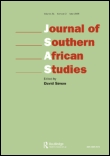
JOURNAL OF SOUTHERN AFRICAN STUDIES
Illuminating the Complexities of Southern African StudiesThe JOURNAL OF SOUTHERN AFRICAN STUDIES, published by Routledge Journals, Taylor & Francis Ltd, is a premier scholarly outlet dedicated to the exploration and analysis of social, political, and cultural dynamics affecting the Southern African region. With an established history since 1974, this journal features articles that contribute significantly to various disciplines, including Arts and Humanities, Sociology, and Geography, and is recognized within its fields as evidenced by its Q2 and Q3 quartile rankings in the latest assessments. Offering a rich academic platform for researchers, professionals, and students, it fosters interdisciplinary approaches and welcomes critical discourse on contemporary issues, ensuring relevance and impact in today's rapidly changing socio-political landscape. Notably, the journal has achieved commendable rankings on Scopus, affirming its standing as an influential source of knowledge. Although not open access, it remains a vital resource for those seeking to deepen their understanding of Southern Africa and its global implications.
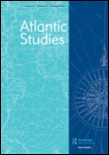
Atlantic Studies-Global Currents
Connecting Scholars Through Atlantic InsightsAtlantic Studies: Global Currents is an esteemed journal published by Routledge Journals, Taylor & Francis Ltd, dedicated to the interdisciplinary exploration of the Atlantic region's cultural, historical, and literary narratives. Since its inception in 2010, the journal has established itself as a vital platform for scholars seeking to engage with the complexities of Atlantic Studies, offering a valuable resource that fosters innovative discourse and critical analysis. With its 2023 rankings placing it in the Q1 category in History and Literature, as well as Q2 in Cultural Studies, it is recognized for its substantial contribution to these fields. The journal is highly regarded, boasting impressive Scopus ranks, including a rank of #152 out of 1106 for Literature and Literary Theory, reflecting its significant influence and impact within the academic community. Researchers and students alike will find Atlantic Studies: Global Currents an essential journal that not only disseminates cutting-edge research but also expands the understanding of global currents shaping the Atlantic world today.

South African Journal of Art History
Elevating Scholarship in Visual Culture and Art NarrativesSouth African Journal of Art History is a premier academic publication dedicated to the exploration and critical analysis of art history within the South African context. Published by the Art Historical Work Group South Africa (AHWG), this journal serves as a vital platform for researchers, professionals, and students alike to disseminate innovative research and engage with diverse perspectives on visual culture. With an ISSN of 0258-3542, the journal aims to elevate the study of art history, contributing significantly to the scholarly community's understanding of both local and international art narratives. Although currently not an open access journal, it is committed to high academic standards and in-depth scholarship, ensuring that each article published meets rigorous criteria. As South Africa continues to position itself at the forefront of global art discourse, the South African Journal of Art History stands out as a critical resource for anyone interested in the intersections of art, culture, and history within this dynamic region.

MISSISSIPPI QUARTERLY
Illuminating Contemporary Challenges in Culture and LiteratureMISSISSIPPI QUARTERLY, published by Johns Hopkins University Press, is a distinguished journal that delves into the realms of Cultural Studies and Literature and Literary Theory. Since its inception, the journal has served as a vital platform for scholarly exchange and critical analysis, making significant contributions to understanding literary and cultural phenomena through varied interdisciplinary approaches. With an ISSN of 0026-637X and an e-ISSN of 2689-517X, it operates without Open Access, ensuring a selective dissemination of high-quality research. Despite being positioned in the Q4 quartile based on the 2023 ranking, it maintains a unique appeal for researchers, professionals, and students seeking to navigate the complexities of culture and literature. The journal has converged its publishing years to remain relevant amid evolving academic discourses, ensuring that it continues to address contemporary challenges and themes in literature. As an important academic resource, MISSISSIPPI QUARTERLY promises to stimulate discussion and provoke thought, inviting new voices to contribute to the ongoing dialogue in these critical fields.
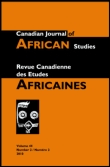
CANADIAN JOURNAL OF AFRICAN STUDIES
Championing Academic Excellence in African StudiesThe Canadian Journal of African Studies is a premier scholarly publication dedicated to the exploration and critical analysis of African cultures, societies, and histories. Founded in 1976 and published by Routledge Journals, Taylor & Francis Ltd, this journal serves as a vital platform for researchers, educators, and practitioners in various fields, including Anthropology, Cultural Studies, History, and Political Science. With its notable Scopus rankings, including a 96th percentile in History and a 89th percentile in Cultural Studies, the journal exemplifies academic excellence and influence within the social sciences. Although the journal does not currently offer open access options, it remains committed to providing high-quality research articles that contribute to the understanding of African issues in a global context. By addressing pressing social and political challenges, the Canadian Journal of African Studies not only serves academic interests but also fosters a deeper appreciation of Africa's diverse experiences and perspectives.
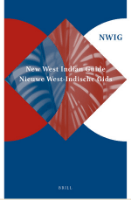
NWIG-New West Indian Guide-Nieuwe West-Indische Gids
Advancing Scholarship on Caribbean Histories and Cultures.NWIG-New West Indian Guide-Nieuwe West-Indische Gids is a prestigious academic journal published by KITLV PRESS in the Netherlands, dedicated to advancing knowledge in the realms of history, cultural studies, and social sciences. Established in 1977, the journal has consistently provided a platform for scholarly discourse, focusing on the Caribbean and its multifaceted histories, cultures, and societies. With an Open Access model adopted since 2013, it ensures widespread dissemination of critical research that appeals to a diverse academic audience. In 2023, the journal has been recognized with notable quartiles, ranking in Q2 for both cultural studies and history, underscoring its significance in the field. Researchers and students alike can benefit from its vast collection of articles exploring important themes relevant to the Caribbean context and beyond, fostering a deeper understanding of the region's impact on global narratives. For a comprehensive and enriching scholarly experience, NWIG invites submissions that push the boundaries of current knowledge and encourage interdisciplinary engagement.
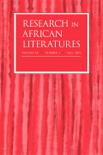
RESEARCH IN AFRICAN LITERATURES
Celebrating the Complexity of African Literary VoicesRESEARCH IN AFRICAN LITERATURES is a prestigious peer-reviewed journal published by Indiana University Press, dedicated to the critical exploration of African literary traditions, cultures, and texts. With an ISSN of 0034-5210 and an E-ISSN of 1527-2044, this journal stands out in the field of literature and literary theory, currently ranking in the 80th percentile of its category according to Scopus, making it a significant platform for scholars and researchers alike. Since its establishment, the journal has evolved through converged volumes from 2002 to 2024, consistently fostering innovative discourse and interdisciplinary approaches that illuminate the complexities of African narratives. Although it does not offer open access, the journal is integral for anyone engaged in African studies, providing critical insights that are essential for understanding the broader implications of literature within diverse cultural contexts. The journal's commitment to high standards of scholarship is reflected in its Q3 quartile ranking and its influential contribution to contemporary literary dialogue.